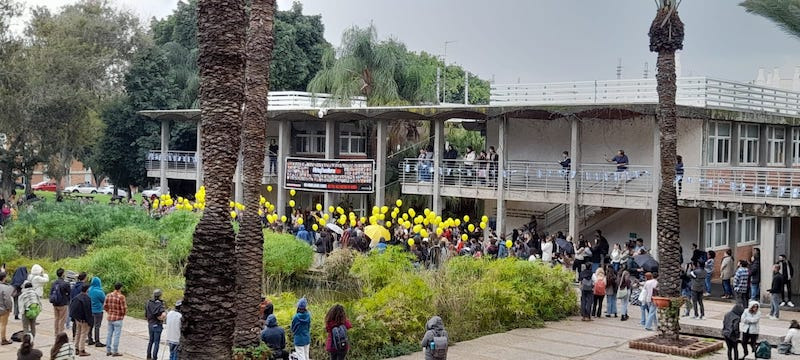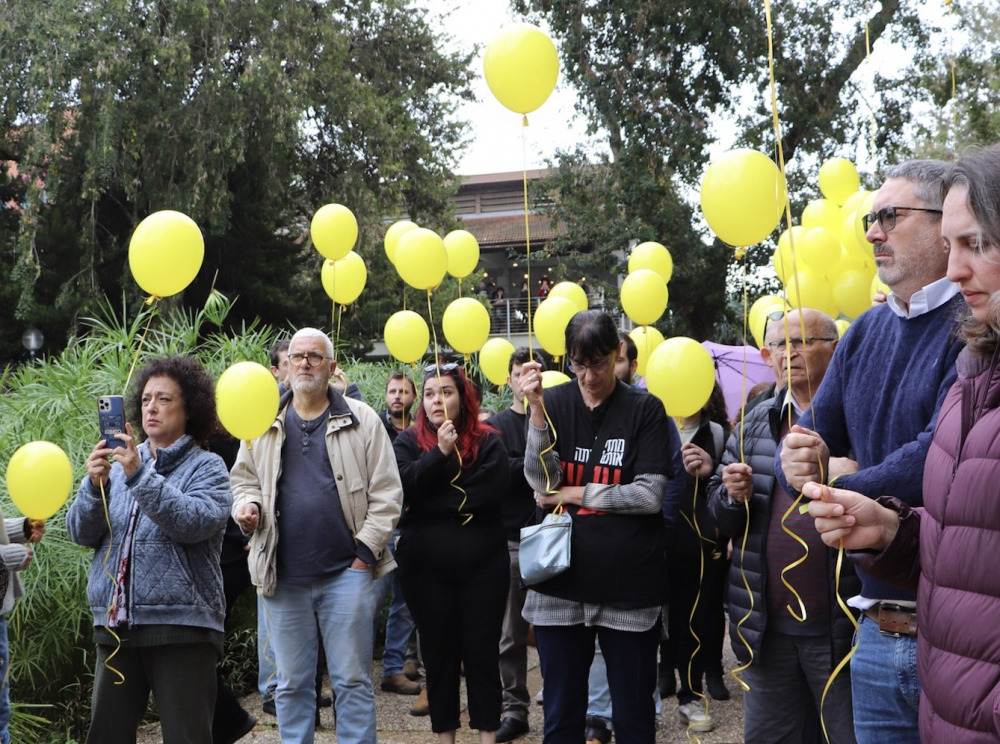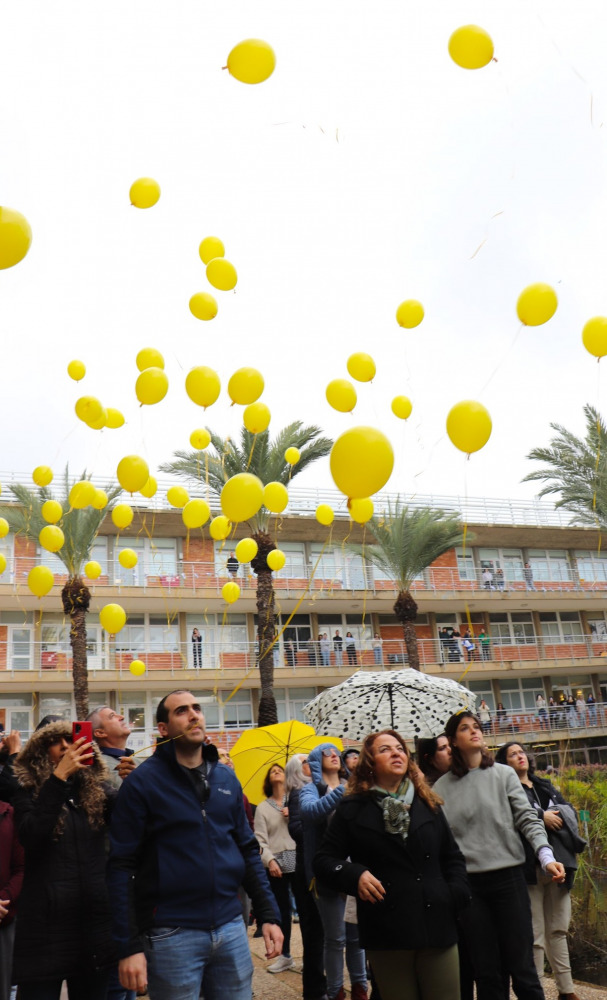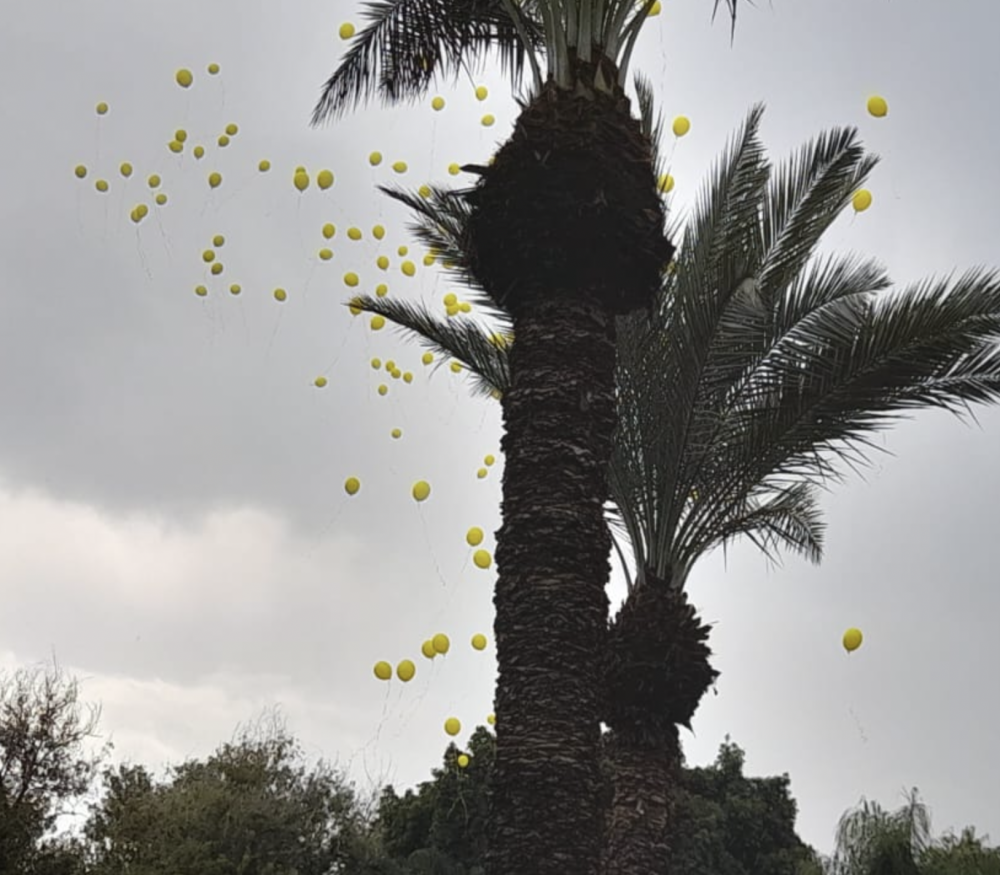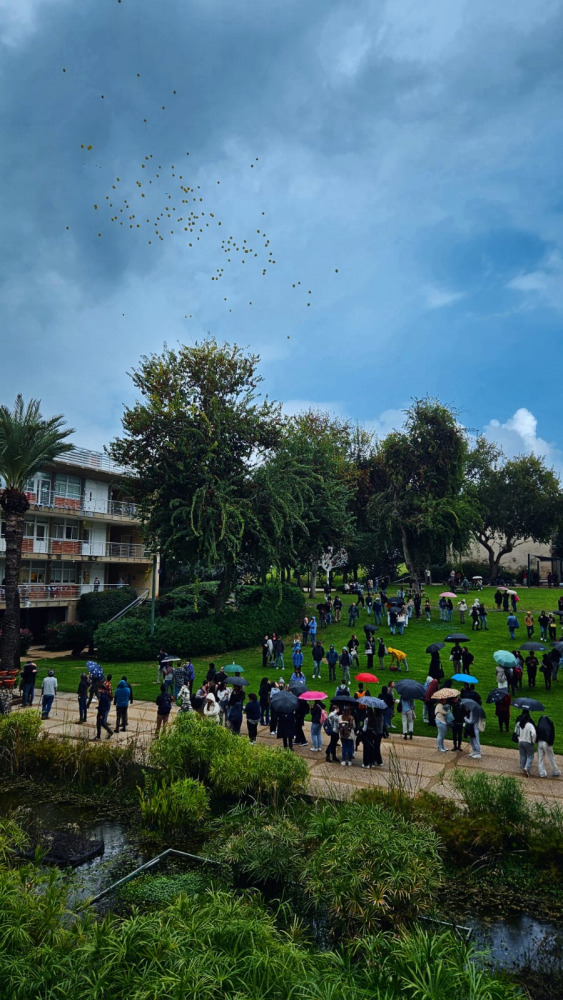Address at the Hebrew University of Jerusalem, Faculty of Agriculture Food and Environment, solidarity rally for the kidnapped, one hundred days into the war.
Prof. Aron Troen
February 14th, 2024
One of the things people tell us when they come to console or share in our grief, or when they try express the horror that we all find ourselves in, is that "there are no words." And indeed, words are inadequate to describe the dark and terrible situation we are in. But there are words, and we have just heard words (invoked by Dean Burdman and Yuval Haran), and we have heard the names of the kidnapped read out loud one by one, and all of our words are needed to demand, to cry out, for the immediate return of the kidnapped. As already stated here today, those who are gone are gone, but the living must be returned.
But the words are hard, and it is heart-rending to write about my sister and brother-in-law in the past tense, and about all the many others who are gone. So, I sat and wrote down my words to you, and I hope that if I go a little longer than the five minutes allotted to me, that standing here together, we might feel and experience the eternity of these moments, as the passing time must feel to all those who have been kidnapped and removed so far from us physically, but who remain so close in our hearts.
I am uncomfortable to stand here before my students and friends, not in my role as an academic or due to my achievements in research and teaching, but as a witness to the abhorrent hate crime committed against my family. A representative of the countless cases of premeditated murder and kidnapping, ruthlessly planned, against each and every one of us, to inflict death, suffering, and unimaginable pain, both physically and mentally. Pain that persists in the uncertainty we face when we don't know what is happening to our loved ones, while it is abundantly clear that they are suffering torment and mortal danger. Atrocities that are also an existential threat, intended to undermine our shared existence here, and which are a crime against all of humanity.
One hundred days ago, my sister Shahar (Debbie) and my brother-in-law Shlomi were murdered by terrorists in their home in Kibbutz Holit, while shielding their son Rotem. Amidst the sound of rocket explosions and gunfire, Hamas terrorists burst into their home with shouts of "Allahu Akbar" – God is great. They blew up the door, severed Shlomi's arm and his life as he fell and bled, threw a grenade that killed my sister, who lay protecting her son Rotem with her body, and then shot him in the abdomen through her lifeless body, leaving him for dead. They set the house on fire, luckily not finding him later when they returned to ensure the elimination or kidnapping of survivors. Rotem, hiding for a long time under his mother's body, heard the murderers laughing before they left the scene.
My family and I, my children, their cousins, my brothers and sisters, my parents, and my 99-year-old grandmother, witnessed the horror unfolding in our family WhatsApp group in our bomb shelters, with Shahar initially asking if we were OK – (she had heard we were under rocket attack in our communities in central Israel as well, and in fact one fell and obliterated a home six houses down from us, then sharing hearing gunfire, glass shattering in their home, and her fear) – and then abruptly, Rotem sent us the horrifying message, "Mom and Dad are dead. Sorry."
The mind cannot bear the horrors that are already familiar to all of us today: the terrorists systematically went from house to house and murdered their neighbors families. Among the victims was a 90-year-old Holocaust survivor and his caregiver, and a mother who was shot in front of her young daughter, after which they caressed the girl’s face, smiled and left her alone with her mother's body. Rotem’s siters, my nieces Shir and Shaked, hid in another place on the kibbutz and survived as well. Through the wall of their hiding place, they heard the murderers playing music and smoking hookahs which they brought to celebrate the havoc they sowed.
On that same morning, the Hamas terrorists kidnapped the AlZayadni family who were at work in the Holit dairy cowshed; the father Yosef, and the children Hamzah, Bilal, and Aisha. This Bedouin family from the town of Rahat had worked in Holit for the past 17 years. Along with the other kidnapped individuals, the AlZayadni family are sorely missed, including by many of our faculty’s janitorial staff who live in Rahat and know the family. Aisha and Bilal were released on the last day of the initial release deal, because they are only 17 and 18 years old. They had pleaded with their captors to be kept and have them release their father and brother instead: Hamzah, who is a father of two toddlers, and Yussef, who heads an extensive family. Yosef has diabetes and hasn't received insulin for 100 days; the family has received no sign of life, and there is serious concern about his fate. And they are but two among all the many kidnapped individuals whose names we have just heard.
I know their cousin Fouad, who directs the community center in Rahat, from research that I led on nutritional security in Israel. A few weeks ago, Fouad and I unexpectedly found ourselves in the U.S. Congress, where we arrived, along with the AlZayadni’s uncle Ali, to testify first-hand about the Hamas crimes and demand the release of the kidnapped along with Dr. Shoshan Haran who had just been released from captivity and several other victims of the Hamas atrocities (Haran is a Hebrew University Faculty of Agriculture alumnus and founder and president of Fair Planet an NGO addressing poverty and world hunger, her son Yuval spoke at the rally) . Fouad, who also established a joint Moslem-Jewish situation room following to meet the emergency needs of the Bedouin and Jewish communities, pointed out that this event highlights how we have a common destiny in Israel, and that Hamas has nothing to do with the religion or the common God we share, the God of Abraham, nor with the well-being of the Palestinians.
There is no doubt about the nature of the cruel enemy whom we face in this fight for our lives and for our way of life, and against whom we will prevail. But we do confront a question: how should we act, and who will we become, while facing such heinous evil? And how can we maintain a common compass, shared by all of us here, who cherish life, freedom, and peace?
Personally, I find that the legacy left by Shahar and Shlomi hints at an answer, which perhaps might help us all. Shahar (Dawn in Hebrew) and Shlomi (my Peace in Hebrew), as their names imply, were people of peace, and great light. As children of the Negev and Be'er Sheva, they settled in Kibbutz Holit to raise their family and build a community. They were musicians, creators, and pioneers; vibrant, funny, and sometimes sad; good friends, siblings, parents, lovers of people, lovers of life, and seekers of peace; educators, teachers for life, and passionate for culture. They met at the Rimon School of Music, and found education and culture as their vocation, leading a modest life rather than pursuing celebrity and entertainment, directing their considerable talents and energy to enrich the spirit and nurture the identity of the community, society, and the country they chose to live in, and upon whose border they were murdered. They were faithful to the founding principles of the State of Israel, championing complete equality for one and all, and they were among the founders of the Hagar School, which integrates Jews and Muslims in Be'er Sheva with the goal of living and learning together.release
The life-affirming values and moral legacy that Shahar and Shlomi bestowed to their children, are evident in their children’s initial instinctive reactions to the infernal horrors they endured. The three, Shir, Shaked, and Rotem are determined to bear witness to the horrors that their parents murderers perpetrated: the murders of their parents before their eyes, the abduction of their friends, and the destruction of their flourishing homes; so that their sacrifice will not be in vain, and their memories will not be erased. These children who have stared absolute evil in the eye, and yet they stubbornly refuse to lose their sense of humor, love for life, and human dignity. In their testimony to the public, to Congress, to their family, and to us all, they insist that we understand the reality in which they and their friends had lived, and in which we all live today; they demand that the murderers and those who sent them are held accountable and brought to justice, but they eschew vengeance and hatred. What distinguishes us from the abhorrent murderers who sanctify death, is that we are a life-seeking people who sanctify life, and therein lies our strength.
Thus I offer you my partial answer to the question I posed – who are we in the face of evil? we here, members of the Faculty of Agriculture community? Most of us chose to come here to study or to dedicate our professional lives to our chosen fields, not because we hoped to enrich ourselves, become famous or for primarily selfish motives.
The root of the word “Haklaut”, Agriculture in English, is culture, and its verb, is to cultivate. Much as Shahar and Shlomi’s artistic, cultural, and educational pursuits were aimed at nurturing, cultivating and enriching the spiritual life of the society in which they lived, so too our field of Agriculture seeks to culture or cultivate the world of living beings and the environment, taming the wild and sometimes threatening Nature. Collectively, our work promotes human and environmental welfare, for the benefit of all. The DNA of each and every one of us is identical without distinction of religion and nationality, and our science breaks boundaries and transcends borders in the service of all humanity.
Just as Dr. Shoshan Haran worked in Africa to benefit humanity, not because they (the people she assisted) were Jews, not because they were Muslims, but because they were human beings. As educators, we must remember that our accomplishments are not measured only in terms of publications, grants, patents, grades and accolades, and all the things we engage with here on a daily basis. Rather, it is in the real impact we have - the quality of our contribution to the well-being of each individual who collectively compose the shared society in which we live, in compassion, in our friendships, in our humanity, and in the vital bonds we build amongst ourselves.
Furthermore, the values of Science are rooted in Truth, and the interrogation of Truth and Reality, even when this challenges sources of authority and power. Truth-seeking must be complemented by humility and skepticism, and the acknowledgment that even when we are convinced that we are right, we may be mistaken. These values must guide us when we examine the unfortunate realities of the war that has been imposed on us, as well as its conduct by our public leaders, and should inform our demand that they bring about the release of the kidnapped, and that they offer a description of a victory that is not only defined by the necessary dismantling of the military power of those seeking our lives, but also in terms of a vision of a shared future in which we and our children and families can live in peace.
In the days when incendiary balloons and threats of war were launched from Gaza to Israel, Shahar and Shlomi participated in a demonstration where balloons were flown on the border fence bearing messages of peace and coexistence. My nephew Rotem, in his testimony to Congress, said that we will not bring back his mother, father, or any of the fallen victims, but he appealed that we do everything in our power to bring back the hostages alive. Today, we release balloons, to symbolize our demand free the captives, and as a symbol for the freedom every soul in every is entitled to, to live and to flourish in dignity, freedom, and peace.
I thank everyone who has supported us, me, my family, and all who were personally affected, near and afar, in our difficult hour. Your kindness enables us to continue to affirm the good and confront evil, and to know that we live among people who seek goodness, life and peace. I am very grateful to this special community and family of the faculty; I do not know how I would manage without your support. I fervently hope that we will see the kidnapped among us again, alive, very soon, right now.
I would like to conclude with a song, in honor of Shlomi and Shahar, who were responsible for the ceremonies and celebrations in their community in Holit, the Eshkol regional council, and the Negev. I identify their character in the following song, and I want to think that they would agree with me:
Who is the one who desires life,
Who loves all his days
To see good.
Guard your tongue from evil,
And your lips from speaking deceit.
Turn away from evil, and do good,
Seek peace and pursue it.
May we all be so fortunate to live this way, in mutual commitment and solidarity, learning together, living together, pursuing peace, and doing good, together.
We will prevail, and may it be so.



